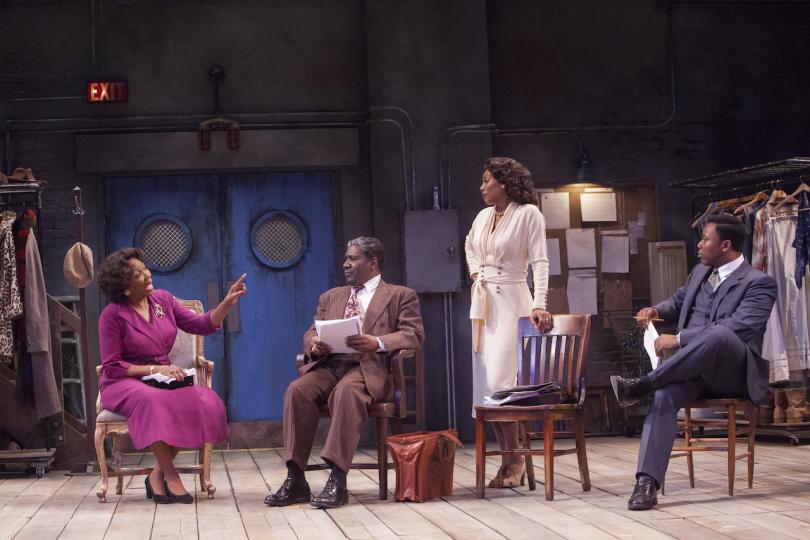Past and present trouble

Despite some of the reactions I heard from the Guthrie’s audience on Friday night, Alice Childress’s Trouble in Mind is not a “timely” play. “Timely” is a word I would use to describe something outdated but still relevant, like a production of an old classic whose themes nonetheless speak to the present day.
Although it was first produced in 1955, Trouble in Mind is not “timely.” Trouble in Mind is current. Its critique of the representation of Black characters isn’t resonant with modern life – it is modern life.
The play centers around a group of mostly-Black actors cast in a production called “Chaos in Belleville,” which is set in the rural South and follows a Black man’s fight for voting rights. Its director, Al Manners, is a white man with the seemingly well-meaning mission of casting more Black actors in leading roles on Broadway.
The problem, as you might expect, is that those leading roles aren’t exactly the truthful portrayals that the actors had hoped for. The leading lady, Wiletta Mayer (played with elegant assurance by Margo Moorer), finds herself cast in yet another Mammy role, complete with soulful spirituals – since presumably the character isn’t intelligent or educated enough to express her feelings in words. Sheldon Forrester (Cleavant Derricks), playing her husband, has little to do on stage other than whittle a stick.
The actors in “Chaos in Belleville” are well aware of the issues with the script. But what is there to do? As Mr. Manners points out, at least they have roles to play and a way to put food on the table. In his mind, the problem is that “the American public is not ready to see you the way you want to be seen” – so his cast will have to settle for less if they want to work at all.
The more things change. . .
This attitude – to stop complaining, stop thinking, and be grateful you even have a job, especially if you’re female – will be familiar to anyone who followed the controversy around Tonya Pinkins’ departure from the Classic Stage Company’s production of Mother Courage in January 2016. The “blame it on society” excuse certainly turned up in the Academy’s backlash to #OscarsSoWhite. And when Millie Davis (Austene Van) complains that she’ll be damned if she has to wear another bandanna, she might as well be Viola Davis, who told CNN in 2013 that she was tired of playing maids.
Trouble in Mind is a splash of cold water to the face of anyone who thinks that the cultural landscape has made significant progress in the past sixty years. But this production is also an entertaining, superbly-acted piece of theater, and although the roles in “Chaos in Belleville” are highly stereotypical, all of the characters in Trouble in Mind are fully three-dimensional.
This is even more notable given how easily Trouble could be read as an “issue play,” with each character representing a different facet of the question of diversity in theater. Sure, they all have their perspectives, from the educated, idealistic white college grad trying her best to square her ideals with real life, to the members of the old guard who made their careers by playing to their white employers’ (and audiences’) expectations. But every single member of the ensemble delivers a nuanced performance that makes Trouble a fully-rendered piece of drama, rather than an academic argument.
An all-around standout cast
Most notable among an all-around standout cast are Margo Moorer, Cleavant Derricks, and John Catron. Moorer takes the role of Wiletta through a full ideological transformation in a completely organic way, culminating in a sense of both triumph and tragedy when she finally finds her voice in the second act. Derricks adds layers of emotion and the burden of history to the uneducated, ageing Sheldon Forrester. And Catron, in the role of Mr. Manners, is the perfect embodiment of That Guy – the one who tries to argue against white privilege by talking about how hard he had it as a child, the one who claims to be helping people of color while totally erasing their experiences with the argument that “there is only one race… the human race.” As despicable as he is, you could easily imagine meeting Mr. Manners at a bar or your next workplace function. Maybe you already have.
Director Valerie Curtis-Newton does a beautiful job bringing out the play’s comedy. Despite the heavy subject matter, it is a funny play, but thankfully, we never find ourselves laughing at racism or poverty. Instead, we laugh at the characters’ own foibles, the contradictions within their society, and the all-too-familiar absurdity of the play they’ve been asked to perform. This sixty-year-old play is funny because of how much of it is still true.
I did not expect this play – which never made it to Broadway because Childress refused to rewrite it to please white producers – to feel so urgent and so devastatingly current. It had felt to me that our cultural dialogue around racist character tropes and diversity in casting was a fairly recent phenomenon. Unfortunately, I don’t think Alice Childress was ahead of her time. I think we are several decades behind ours.




